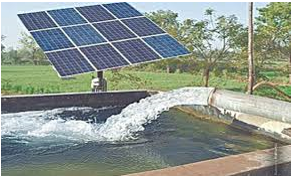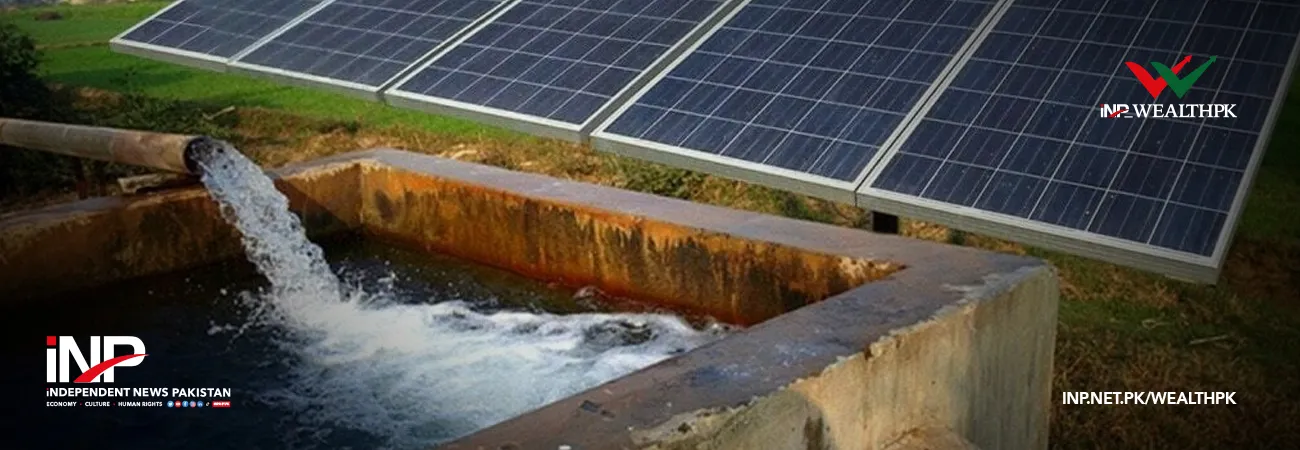INP-WealthPk
Muhammad Luqman
Weary of very expensive grid power and fossil fuels, more and more farmers in Pakistan’s Punjab province are turning to the solarisation of agriculture tube wells.

Currently, 1.2 million tube wells are working in the country, out of which 85% are in Punjab, 6.4% in Sindh, 3.8% in Khyber Pakhtunkhwa, and 4.8% are in Balochistan. Most of them are powered by electricity and fossil fuels. Agricultural electricity tariffs have skyrocketed in Pakistan over the last five years -- jumping from ₨11 to ₨44/kWh. The use of expensive diesel for running tube wells has also become unaffordable.
According to the farming community, diesel-operated tube wells cost around Rs3,000 per acre while the electric pumps’ running cost is Rs1,500 per acre. That becomes a major chunk of the agriculture production cost, making farming a non-profitable activity. “In contrast, the solar-powered systems bring this down dramatically to ₨50 per acre, reducing monthly irrigation costs by up to ₨350,000 per farmer,” said Akhtar Farooq Meo, Secretary General of the Punjab Chapter of Kissan Board Pakistan (KBP).
Talking to WealthPK, he said that global solar panel prices have fallen from ₨130 to ₨35 per watt, making solar tube wells financially attractive, especially in countries like Pakistan. In a bid to support farmers in the conversion of fossil fuel-powered and electric tube wells to solarised ones, the Punjab government has launched a subsidy scheme. The Punjab government’s flagship scheme allows each farmer to convert fossil fuel-powered tube wells to solar-powered ones, up to a capacity of 20 kilowatts.
“Initially, the Punjab government will provide subsidies for the conversion of 8,000 agricultural tube wells into solar-powered systems,” said Rana Tajammul Hussain, Director General of Water Management, Punjab Agriculture Department. Talking to WealthPK, he said that balloting for the selection of farmers under the scheme has been carried out. Tajammul hoped that the execution of the scheme would start in July to enable farmers to get their diesel-powered and electric tube wells converted to solar mode.
He said that substantial financial support amounting to around Rs9 billion is being provided to farmers across the province under tube well solarisation scheme. The initiative will support three categories of solar power kits based on horsepower capacity: a Rs500,000 subsidy for 10-horsepower kits, Rs750,000 for 15-horsepower kits, and Rs1,000,000 for 20-horsepower kits. Farmers will be responsible for paying the remaining amount for the solar system installation.
Agricultural economists have supported Punjab government’s scheme, calling it a major step towards cutting down the production cost of all crops. “The cut in the energy cost will help farmers earn more besides bringing down food inflation in the country,” said Ebad Khan, an agriculture economist and Director of the Farmers Associates Pakistan (FAP). However, he said that the cost of installing solar tube wells is high when carried out by contractors hired by the Punjab government.
“This problem can be addressed by allowing farmers to get the tube well solarised from the firm of their choice at competitive rates,” Ebad said. He also emphasised the need for comprehensive grid modernisation and policy reforms to ensure the sustainable integration of solar power into the national energy mix. Ebad said that the government should exempt solar panels used for agricultural purposes from all sorts of taxes to accelerate the farming community’s transition to alternative energy sources.
Credit: INP-WealthPk













